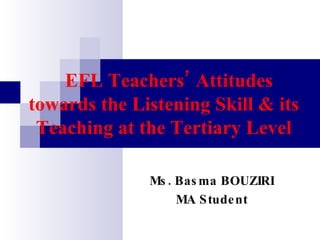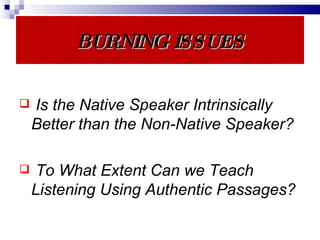Research On Teachers Attitudes
- 1. EFL Teachers’ Attitudes towards the Listening Skill & its Teaching at the Tertiary Level Ms. Basma BOUZIRI MA Student
- 2. PRESENTATION OUTLINE Rationale. Objectives of the Study. Research Questions. Research Methodology. Findings. Conclusions & Recommendations.
- 3. RATIONALE 1 . The Value of Listening 2. The Complexity of Listening 3. The Neglect of Listening 4. The Importance of Teacher Attitude 5. Issues Related to Teacher Attitude Research
- 4. RATIONALE Attitude Components Affective Component (Feelings) Cognitive Component (Beliefs) Psychometric Component (Behavior)
- 5. OBJECTIVES OF THE STUDY 1. To Address the Three Attitude Components. 2. To Provide Empirical Evidence of a Non Systematic one-to-one Relationship Between Feelings, Beliefs, and Behavior. 3. To Spur Initiatives for Course Design.
- 6. RESEARCH QUESTIONS 1. What Are the Attitudes of EFL Teachers towards the Listening Skill and its Teaching at the Tertiary Level? 2. What are the Teachers’ Perceptions of the Context where they are Teaching Listening? 3. What is the Nature of the Relationship between the Teachers’ Feelings, Beliefs, and their Classroom Behavior?
- 7. RESEARCH METHODOLOGY Participants Research Instruments Questionnaire. Interview. Class Observation. Document Survey. Data Analysis Quantitative Analysis. Qualitative Analysis.
- 8. FINDINGS Teachers’ Attitudes to Listening & its Teaching. Teachers’ Perception of the Teaching Context. The Nature of Interaction between the three Attitude Components.
- 9. Teachers’ Most Important Objectives Response Categories N° % To speak 13 (19.75) To understand 10 (15.25) To get intensive practice 10 (15.25) To get gist 7 (10.75) To get information 5 (7.75) To make inferences 4 (6.10) To listen to different accents 4 (6.10) To enrich vocabulary 3 (4.75) To build confidence 3 (4.75) To react about topics 2 (3.10) To expand their culture 2 (3.10) To develop listening skills 2 (3.10) To concentrate 1 (1.50)
- 10. Types of Activities Used in the Lesson
- 11. Teachers’ Behavior to Improve Students’ Listening Skills Response Categories N ° % Tell them to listen to native speakers 24 (56.10) Teach listening strategies 4 (9.75) Make listening purposeful 3 (7.50) Use of pre-listening activities 2 (5) Stop the tape whenever the answer is given 2 (5) Use interesting topics 2 (5) Miscellaneous 5 (12.5)
- 12. TYPES OF LISTENING ACTIVITIES Frequency Listening Activities Always/Usually Often Rarely/Never Comprehension Questions 93% 7.25% 0% Fill in the blanks 57.25% 35.75% 7.25% True/False 53.75% 35.75% 7.25% Brainstorming 46.50% 28.75% 25% Repetition 43% 14.50% 39.50% Note Taking 32.25% 43% 25% Multiple choice 28.75% 39.50% 32.25% Problem Solving 28.5% 25% 43% Information Transfer 18% 50% 32.25% Give the right order 3.75% 39.50% 57.25%
- 14. Teachers’ Suggestions to Improve the Course Response Categories N ° % Using Language Laboratories 8 (16.75) Coordination 6 (12.50) More Listening 5 (10.50) Using Audiovisuals 5 (10.50) Introducing New Activities 5 (10.50) Introducing New Topics 5 (10.50) Using Authentic Materials 4 (8.50) Miscellaneous 10 (21.75)
- 15. Teachers’ Perceptions of People’s Attitudes Response Categories N ° % Marginalize teachers of listening 18 (50) Teaching listening is effortless 4 (11.25) Are disrespectful to teachers of listening 3 (8.50) Teaching listening is less prestigious 3 (8.50) Listening is left over to low ranked teachers 3 (8.50) Teaching listening is a waste of time 1 (3) Non-Native speakers are incompetent at teaching listening 1 (3) Teaching listening is important 1 (3)
- 16. Cross-tabulating a Testing Approach to Listening with Enjoying Teaching It Item 1.g Item1.c Negative Undecided Positive Positive 75% 100% 69.75% Undecided 0% 0% 21.75% Negative 25% 0% 8.75%
- 17. Cross-tabulating the Natural Development of Listening with Enjoying Teaching It Item 1.l Item 1.c Negative Undecided Positive Positive 80% 80% 61.75% Undecided 10% 20% 23.25% Negative 10% 0% 15.50%
- 19. Implications for Teaching A Process Approach to the Teaching of Listening. The Development of a Listening Syllabus.
- 20. SUGGESTED GUIDELINES FOR A LISTENING LESSON Listening Skills To concentrate & take notes simultaneously To take notes in a selective way To evaluate content via sound argumentation Listening Strategies To set a listening purpose To activate background knowledge Use of shorthand writing Use of discourse connectors to enhance comprehension
- 21. THE LESSON IN ACTION Pre-Listening Stage Reading Brainstorming around pictures While-Listening Stage Literal understanding of the message Drawing inferences Post-Listening Stage Applying meaning to other contexts
- 22. CONTRIBUTIONS Comprehensive & Critical Literature Review. Clear and Interrelated Definitions of Concepts. Empirical Evidence for the Research Questions. High Degree of Reliability.
- 23. LIMITATIONS Sample Size. The Potential Impact of other Attitudes than Teaching Attitudes.
- 24. Research Recommendations Repercussions of Listening Development on Communication Skills. An Analysis of Listening Needs. Experimental Research on the Effects of Teachers’ Attitude.
- 25. BURNING ISSUES Is the Native Speaker Intrinsically Better than the Non-Native Speaker? To What Extent Can we Teach Listening Using Authentic Passages?
- 26. THANK YOU FOR YOUR ATTENTION
Editor's Notes
- There are missing values.


























